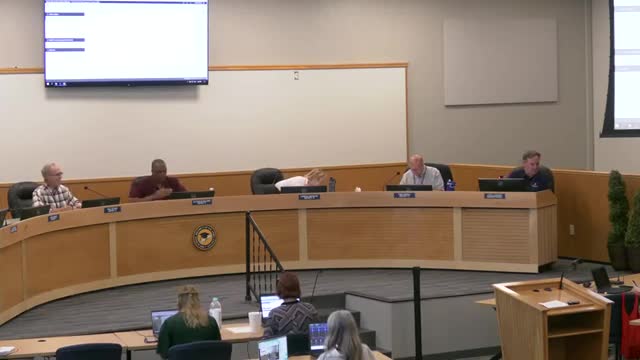Escambia district staff recommend $15 million tax anticipation note to bridge fall cash flow; Wells Fargo bid indicated lowest rate
October 17, 2025 | Escambia, School Districts, Florida
This article was created by AI summarizing key points discussed. AI makes mistakes, so for full details and context, please refer to the video of the full meeting. Please report any errors so we can fix them. Report an error »

District finance staff and outside advisors briefed the Escambia County School Board on a proposed short-term tax anticipation note (TAN) to provide operating cash between the new fiscal year start and the receipt of local property-tax revenue.
Terry (district finance staff) said the TAN would be a short-term operating borrowing intended to bridge an uneven cash-flow period; Will Reed, the district’s financial advisor, told the board staff solicited proposals from roughly 45–50 banks and received seven responses. Will Reed said Wells Fargo — the district’s depository bank — submitted the lowest indicative rate in the bid process (3.29% at the time of the presentation; Reed said that rate moved to 3.26% on the day of the workshop). Reed described the financing as “an inexpensive insurance policy” to protect cash-flow and payroll should tax receipts be delayed or disrupted by events such as a hurricane.
Board members asked for specifics. Finance staff said the proposed maximum borrowing amount is $15,000,000, and that the district plans repayment within the current fiscal year once property-tax receipts arrive. Counsel and advisors clarified the TAN is an operating-side borrowing distinct from capital bonding and should not affect the district’s capital-bond ratings. The board was told that a resolution authorizing the TAN would appear on the upcoming meeting agenda for formal action; no vote occurred during the workshop.
Staff noted that higher investment yields currently held in the district’s short-term portfolio made the borrowing cost comparable and that the primary drivers were timing of FEFP (state funding) receipts and local property-tax schedules. Outside counsel was present to explain legal mechanics of the note and to answer questions about repayment timing and prepayment terms.
The board did not vote at the workshop; staff said a resolution and closing schedule would be presented at the next regular board meeting.
Terry (district finance staff) said the TAN would be a short-term operating borrowing intended to bridge an uneven cash-flow period; Will Reed, the district’s financial advisor, told the board staff solicited proposals from roughly 45–50 banks and received seven responses. Will Reed said Wells Fargo — the district’s depository bank — submitted the lowest indicative rate in the bid process (3.29% at the time of the presentation; Reed said that rate moved to 3.26% on the day of the workshop). Reed described the financing as “an inexpensive insurance policy” to protect cash-flow and payroll should tax receipts be delayed or disrupted by events such as a hurricane.
Board members asked for specifics. Finance staff said the proposed maximum borrowing amount is $15,000,000, and that the district plans repayment within the current fiscal year once property-tax receipts arrive. Counsel and advisors clarified the TAN is an operating-side borrowing distinct from capital bonding and should not affect the district’s capital-bond ratings. The board was told that a resolution authorizing the TAN would appear on the upcoming meeting agenda for formal action; no vote occurred during the workshop.
Staff noted that higher investment yields currently held in the district’s short-term portfolio made the borrowing cost comparable and that the primary drivers were timing of FEFP (state funding) receipts and local property-tax schedules. Outside counsel was present to explain legal mechanics of the note and to answer questions about repayment timing and prepayment terms.
The board did not vote at the workshop; staff said a resolution and closing schedule would be presented at the next regular board meeting.
View full meeting
This article is based on a recent meeting—watch the full video and explore the complete transcript for deeper insights into the discussion.
View full meeting